Loquat: 8 Potential Health Benefits, Nutrition Facts, And Side Effects
Include these Chinese plums in your diet so you can make the most of their healthy goodness!
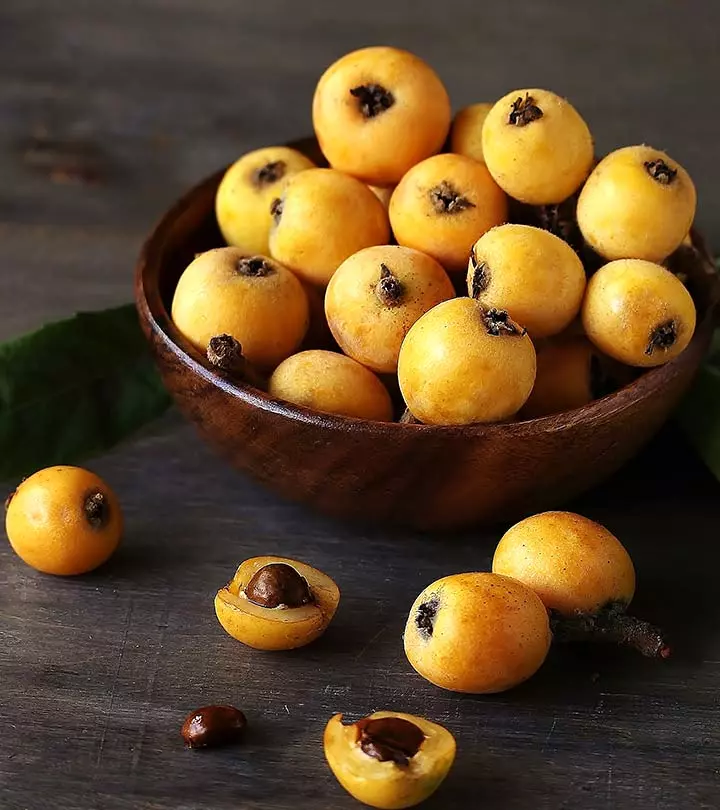
Image: Shutterstock
Several loquat benefits may persuade you to eat this exotic fruit. Loquats (Eriobotrya japonica) are native to China and are packed with antioxidants, flavonoids, and essential nutrients.

Loquats (also called Chinese plums) have a round or pear-shaped body and yellow skin. Their flavor is similar to apricots and cherries. This fruit is commonly consumed raw and processed into jams, jellies, and juices.
Loquat leaves, seeds, and fruit have a wide range of medicinal properties. Evidence suggests that loquats may contribute to heart health, reduce cancer risk, and prevent diabetes. They may also help reduce neurological stress, inflammation, and lower blood cholesterol levels.
This article discusses the benefits of loquats, their nutritional profile, and any potential side effects. Keep reading.
 Know Your Ingredient: Loquat
Know Your Ingredient: LoquatWhat Is It?
Loquat is a sweet fruit with floral undertones and a flavorful taste combination of apricot, plum, and cherry.
What Are Its Benefits?
Loquat helps to treat diabetes, reduces the risk of cancer and also reduces neurological stress.
Who Can Consume It?
Anyone, especially people looking to lower cholesterol levels and improve heart health
How Often?
You can eat this fruit daily.
Caution
Loquat seeds are filled with poisonous cyanide chemicals, which can be fatal since they prevent the body from using oxygen.
In This Article
What Are The Benefits Of Loquat Fruit?
1. Promotes Heart Health
Loquat is rich in potassium. The mineral acts as a vasodilator and reduces strain on the blood vessels (1). Potassium may also lower the blood pressure and protect the heart (2). The magnesium in the fruit is also essential for regulating blood pressure and boosting cardiac function (3).
The phenolic compounds in loquats may prevent cellular damage and reduce inflammation, thus improving heart health (4), (5). These phytochemicals exhibit antioxidant properties that may help reduce the risk of cardiovascular diseases.
Studies have also found that foods rich in antioxidant effects may reduce the risk of heart disease (6), (7). Carotenoid concentrations in foods also reduce the risk of several heart problems (8).
2. May Reduce The Risk Of Cancer
Animal studies state that extracts of leaves and seeds of loquat possess anti-cancer properties (9), (10). Methanol extracts of loquat were found to help prevent the spread of human breast cancer cells (11).
A study conducted by Okayama University found that polyphenols showed cytotoxic activityi A process or the ability of a substance to damage or eliminate living cells, including cancer cells. against human oral tumor cell lines (12). Loquats contain chlorogenic acid that may suppress cancer growth (9), (13). The acid prevents the spread of human colon cancer cells and leads to their death (14).
Loquats contain beta-carotene. A study conducted by the Zhengzhou University found that beta-carotene might have anti-tumor effects (15).
3. Helps Treat Diabetes

Research shows that the extracts of loquat leaves and seeds may have an anti-diabetic activity. They may help in the control and prevention of type 1 and 2 diabetes (9). In a study conducted by the Central Taiwan University of Science and Technology on mice, loquat could lower blood sugar levels (16).
Another study conducted by the Siebold University of Nagasaki on rats and mice found that loquat seeds exhibited hypoglycemic activityi A state that develops when blood sugar drops below normal and reaches a potentially dangerous level. (17).
4. May Offer Anti-Inflammatory Properties
Loquats possess anti-inflammatory properties. Diseases such as cardiovascular and neurodegenerative disordersi A group of conditions caused by progressive death of the nerve cells and affect brain functions. are associated with inflammation (18), (19). Loquat juice was found to have preventive effects on inflammation (20).
In mice studies, fruit extracts of loquats were found to reduce inflammation caused by a high-fructose diet (21). More long-term research is needed to understand the effects of loquat on inflammation.
5. May Reduce Blood Cholesterol Levels
Loquat contains pectin, a type of fibre that may lower cholesterol levels. A study conducted by Maastricht University found that pectin reduces total cholesterol concentrations in humans (22). However, limited research is available in this regard.
6. May Reduce Memory Impairment And Neurological Stress

Loquat extracts reduce memory impairment and help prevent neurological stress. The carotenoid antioxidants in loquat combat the oxidative stress caused by free radicals. A study conducted by the Yonsei University College of Medicine found that loquat had neuroprotective effects. The fruit may act against memory impairment and oxidative stress (23).
7. Aids Digestion
The leaves of loquat are traditionally used for soothing the digestive system (24). The pectin in loquat can act as a digestive aid. A study conducted by the Shiga University of Medical Science on rats found that pectin might increase the amount of intestinal mucosa (25), (26). Dietary fiber can stimulate peristaltic motion (wave-like contractions) and promote regularity of bowel movements.
In addition, the intake of loquats may help enhances immunity system function, improves eyesight, and boosts respiratory health (27). Many anecdotal evidence suggests that they may aid in weight loss, boost metabolism, and detoxification. Whereas, the leaves of loquat possess excellent anti-aging properties (24).
8. Relieves Sore Throat
Loquats may provide comfort for sore throats. A study on the anti-inflammatory qualities of fruit and vegetable juices, including loquat, observed that loquat juice showed potential anti-inflammatory effects (28).
Further, loquat leaves contain essential oils that have expectorant and antiasthmatic properties which help relieve coughs, sore throats, and hoarseness. This therapeutic effect is due to anti-inflammatory chemicals present in loquat leaves such as ursolic acid (UA) and hawthorn acid (29). While research is still limited on its effectiveness in the treatment of sore throat, loquat, its leaves and other loquat substances do offer certain benefits that may help relieve it.
 Trivia
TriviaIn the following section, we have extensively covered the nutritional profile of loquat.
Key Takeaways
- Loquat tea and juice are powerhouses of carbohydrates, vitamins, and minerals.
- Loquat promotes heart health, neurological health, and good digestion.
- It reduces inflammation, the risk of cancer, lowers cholesterol and diabetes, and reduces memory problems.
- Excessive consumption of loquat may lead to toxic myopathy.
Loquat Nutrition Facts
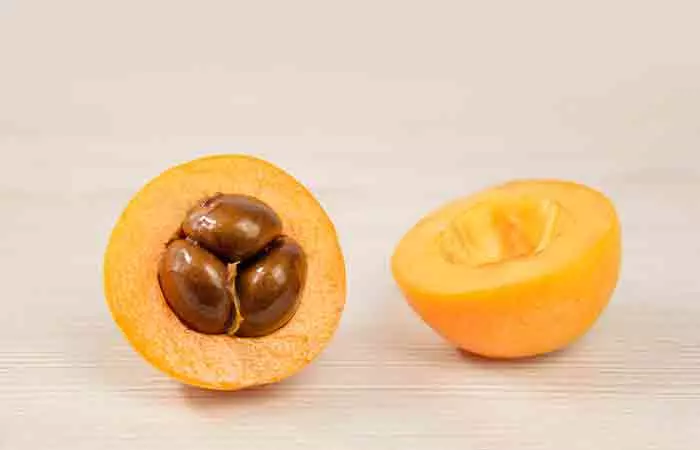
Loquat is an excellent source of vitamins, minerals, and carbohydrates. It also contains monounsaturated fats like omega-3 and omega-6 fatty acids. The fruit is also low in cholesterol and calories as it hardly contains any lipids. According to the United States Department of Agriculture, one cup (149 grams) of loquats contains (30):
- Energy: 70 kcal
- Protein: 0.641 g
- Carbohydrate: 18 g
- Fiber: 2.53 g
- Calcium: 23.8 mg
- Folate: 20.9 mg
- Vitamin B6: 0.1 mg
Additionally, loquats contain small amounts of vitamin B1, vitamin C, vitamin A, riboflavin, copper, iron, calcium, and phosphorus.
These promising benefits and nutrition facts of loquat may have left you wondering how to have it. Check out the next section to know more.
Preparation And Usage
- When buying loquats, pick ones that are ripe and slightly soft to the touch. They should have a golden-yellow color, but not be too mushy.
- Start by cutting off both ends of the loquat. Then, gently peel off the skin with your fingers or a knife. The skin comes off easily once you cut the ends.
- After peeling, cut the loquat in half. Inside, you’ll find a few large seeds. You can remove them with your fingers or a small spoon.
- Loquats are delicious on their own! Just wash them and enjoy their sweet and slightly tangy taste.
- You can blend loquats with other fruits like oranges or apples for a refreshing juice or smoothie.
- Loquats can be used in jams, jellies, or pies. Simply cook them down with sugar and lemon juice to create a sweet treat.
- Loquat leaves can be brewed into a soothing tea. Just boil a few leaves in water for about 10 minutes, then sip and enjoy.
Here are a few recipes to help you out.
How To Eat Loquat

You can consume the fruit in different ways. We have included a couple of simple recipes.
Loquat Tea
Ingredients
- 2 to 4 inch loquat leaves
- 2cups of water
Procedure
- Mince the leaves and combine them with the water.
- Bring the mixture to a boil. Reduce the heat and simmer for 15 minutes.
- Remove from the heat, cover, and let the tea steep for 10 minutes.
- Strain and serve hot, or allow to cool and serve iced.
Loquat Juice
- 10 loquats
- 1 glass of water
- 2 tablespoons of sugar
- 1 tablespoon of lemon juice
- A pinch of salt
- 1/4 teaspoon black salt (optional)
Procedure
- Peel the skin of loquats and discard the seeds. Add all the ingredients in a blender.
- Blend for a few minutes.
- Add ice and blend for a few more seconds.
- Serve immediately.
Jared Rydelek, a YouTube blogger, tried loquat and shared his experience of this delicious fruit. In his vlog, he states, “They are kind of interesting because if you eat like a lot of loquats there is a mild sedative effect…. There are some discrepancy on whether or not you should peel it or not peel it, some people peel it…. The skin is a little difficult to eat…. The texture’s a little bit soft and very juicy…, inside it’s got several like 3 or 4 of these seeds right here. The flavor is, it reminds me a little bit like the Ya pear [Japanese pear] of all things, it’s just like really really mild and juicy…. It tastes little bit like a pear, maybe with like a very mild peach or plum flavor to it (i).”
 Trivia
TriviaThough loquat is generally safe for consumption, it does have a few side effects that you need to keep in mind. Check them out in the following section.
What Are The Side Effects Of Loquat?

Excess consumption of loquat may cause toxic myopathy. Limited information is available to conclude if the fruit may have any other side effects.
Toxic Myopathy
In a study, a patient with hypertriglyceridemia (high levels of triglyceridesi A type of fat circulating in the blood, and the body uses it as a primary source of energy. ) who had ingested 2 litres of loquat leaf tea in two weeks saw a remarkable decrease in triglyceride levels. However, he also experienced inflammatory myopathy (a muscle disease leading to muscle weakness) (31).
In some people, loquat consumption might also cause allergic reactions (32). Therefore, it is best to be cautious before consuming loquat and consult a healthcare provider if you have any other health conditions.
Infographic: 5 Good Reasons For Eating Loquat
Loquat is a popular pear-shaped yellow fruit in China. Other than adding sweetness to your favorite dishes, this fruit is rich in antioxidants and several nutrients that help boost digestion and reduce cholesterol levels. Check out the infographic below to know how loquat can improve your overall health and well-being.

Illustration: StyleCraze Design Team
Loquat’s benefits can be attributed to its antioxidants, flavonoidsi A group of naturally occurring antioxidants in fruits and vegetables which protect the body from diseases. , and other beneficial nutrients. This exotic fruit can promote cardiovascular health, aid in digestion, and reduce cancer risk, memory impairment, and neurological stress. It also helps in managing diabetes and cholesterol levels. To reap its benefits, you can have the juice of the fruit directly, or the tea made with its leaves. However, excess consumption of loquat may trigger undesirable side effects like toxic myopathy. Hence, caution is advised.
Frequently Asked Questions
Are loquat leaves poisonous?
The young leaves of the loquat could be slightly poisonous. They contain cyanogenic glycosides that release cyanide into the system upon digestion.
Can you be allergic to loquat fruit?
Loquat fruit may cause allergies in some people. However, there is no scientific evidence to prove this point.
Are loquat seeds edible?
No, the seeds and young leaves of the loquat are not edible. They could be slightly poisonous due to the presence of glycosides. They are unsuitable for human consumption.
How do you know when a loquat is ripe?
A ripe loquat has a yellow-orange color at the top of its stem with no green. The loquat fruit needs to ripen on the tree itself.
What do loquats taste like?
The fruit tastes sweet when ripe and the flavor is a blend of citrus, plum, and apricot.
Should loquats be refrigerated?
If you want to store them longer then they should be refrigerated.
Are loquats related to mangoes?
No, loquats are not related to mangoes.
Can you eat loquat skin?
Yes, you can eat the loquat fruit skins.
What is the difference between kumquats and loquats?
While loquats belong to the family of apples, pears, and peaches, kumquats belong to the orange family. There are numerous kumquat benefits that make them a nutritious addition to your diet.
Is loquat good for your liver?
Possibly yes. Loquat contains polyphenols, which have potent antioxidant activities. These beneficial compounds may help protect the liver from fructose-induced fatty liver (21).
Illustration: Loquat: 7 Potential Health Benefits, Nutrition Facts, And Side Effects

Image: Stable Diffusion/StyleCraze Design Team
References
Articles on StyleCraze are backed by verified information from peer-reviewed and academic research papers, reputed organizations, research institutions, and medical associations to ensure accuracy and relevance. Read our editorial policy to learn more.
- Haddy FJ, Vanhoutte PM, Feletou M. Role of potassium in regulating blood flow and blood pressure. Am J Physiol Regul Integr Comp Physiol. 2006;290(3):R546–R552.
https://pubmed.ncbi.nlm.nih.gov/16467502/ - Weaver CM. Potassium and health. Adv Nutr. 2013;4(3):368S–77S. Published 2013 May 1.
https://pubmed.ncbi.nlm.nih.gov/23674806/ - DiNicolantonio, James J et al. “Magnesium for the prevention and treatment of cardiovascular disease.” Open heartvol. 5,2 e000775. 1 Jul. 2018.
https://www.ncbi.nlm.nih.gov/pmc/articles/PMC6045762/ - Lutz, Mariane et al. “Roles of Phenolic Compounds in the Reduction of Risk Factors of Cardiovascular Diseases.” Molecules (Basel, Switzerland) vol. 24,2 366. 21 Jan. 2019.
https://www.ncbi.nlm.nih.gov/pmc/articles/PMC6359321/ - Lopez-Candales, Angel et al. “Linking Chronic Inflammation with Cardiovascular Disease: From Normal Aging to the Metabolic Syndrome.” Journal of nature and science vol. 3,4 (2017): e341.
https://www.ncbi.nlm.nih.gov/pmc/articles/PMC5488800/ - Ye Z, Song H. Antioxidant vitamins intake and the risk of coronary heart disease: meta-analysis of cohort studies. Eur J Cardiovasc Prev Rehabil. 2008;15(1):26–34.
https://pubmed.ncbi.nlm.nih.gov/18277182/ - Aune D, Keum N, Giovannucci E, et al. Dietary intake and blood concentrations of antioxidants and the risk of cardiovascular disease, total cancer, and all-cause mortality: a systematic review and dose-response meta-analysis of prospective studies. Am J Clin Nutr. 2018;108(5):1069–1091.
https://pubmed.ncbi.nlm.nih.gov/30475962/ - Riccioni G. Carotenoids and cardiovascular disease. Curr Atheroscler Rep. 2009;11(6):434–439.
https://pubmed.ncbi.nlm.nih.gov/19852884/ - Liu, Yilong et al. “Biological Activities of Extracts from Loquat (Eriobotrya japonica Lindl.): A Review.” International journal of molecular sciences vol. 17,12 1983. 6 Dec. 2016.
https://www.ncbi.nlm.nih.gov/pmc/articles/PMC5187783/ - You, Mi-Kyoung et al. “Loquat (Eriobotrya japonica) leaf extract inhibits the growth of MDA-MB-231 tumors in nude mouse xenografts and invasion of MDA-MB-231 cells.” Nutrition research and practice vol. 10,2 (2016): 139-47.
https://www.ncbi.nlm.nih.gov/pmc/articles/PMC4819123/ - Kim, Min-Sook et al. “Loquat (Eriobotrya japonica) extracts suppress the adhesion, migration and invasion of human breast cancer cell line.” Nutrition research and practice vol. 3,4 (2009): 259-64.
https://www.ncbi.nlm.nih.gov/pmc/articles/PMC2809231/ - Ito H, Kobayashi E, Takamatsu Y, et al. Polyphenols from Eriobotrya japonica and their cytotoxicity against human oral tumor cell lines. Chem Pharm Bull (Tokyo). 2000;48(5):687–693.
https://pubmed.ncbi.nlm.nih.gov/10823708/ - Lukitasari, Mifetika et al. “Chlorogenic Acid: The Conceivable Chemosensitizer Leading to Cancer Growth Suppression.” Journal of evidence-based integrative medicine vol. 23 (2018): 2515690X18789628.
https://www.ncbi.nlm.nih.gov/pmc/articles/PMC6073821/ - Sadeghi Ekbatan, Shima et al. “Chlorogenic Acid and Its Microbial Metabolites Exert Anti-Proliferative Effects, S-Phase Cell-Cycle Arrest and Apoptosis in Human Colon Cancer Caco-2 Cells.” International journal of molecular sciences vol. 19,3 723. 3 Mar. 2018.
https://www.ncbi.nlm.nih.gov/pmc/articles/PMC5877584/ - Zhang Y, Zhu X, Huang T, et al. β-Carotene synergistically enhances the anti-tumor effect of 5-fluorouracil on esophageal squamous cell carcinoma in vivo and in vitro. Toxicol Lett. 2016;261:49–58.
https://pubmed.ncbi.nlm.nih.gov/27586268/ - Shih CC, Lin CH, Wu JB. Eriobotrya japonica improves hyperlipidemia and reverses insulin resistance in high-fat-fed mice. Phytother Res. 2010;24(12):1769–1780.
https://pubmed.ncbi.nlm.nih.gov/20564460/ - Tanaka K, Nishizono S, Makino N, Tamaru S, Terai O, Ikeda I. Hypoglycemic activity of Eriobotrya japonica seeds in type 2 diabetic rats and mice. Biosci Biotechnol Biochem. 2008;72(3):686–693.
https://pubmed.ncbi.nlm.nih.gov/18323632/ - Paquissi, Feliciano Chanana. “The role of inflammation in cardiovascular diseases: the predictive value of neutrophil-lymphocyte ratio as a marker in peripheral arterial disease.” Therapeutics and clinical risk management vol. 12 851-60. 27 May. 2016.
https://www.ncbi.nlm.nih.gov/pmc/articles/PMC4892833/ - Kinney, Jefferson W et al. “Inflammation as a central mechanism in Alzheimer’s disease.” Alzheimer’s & dementia (New York, N. Y.) vol. 4 575-590. 6 Sep. 2018.
https://www.ncbi.nlm.nih.gov/pmc/articles/PMC6214864/ - Lin, Jin-Yuarn, and Ching-Yin Tang. “Strawberry, loquat, mulberry, and bitter melon juices exhibit prophylactic effects on LPS-induced inflammation using murine peritoneal macrophages.”Food Chemistry 107.4 (2008): 1587-1596.
https://www.researchgate.net/publication/223889801_Strawberry_loquat_mulberry_and_bitter_melon_juices_exhibit_prophylactic_effects_on_LPS-induced_inflammation_using_murine_peritoneal_macrophages - Li W, Yang H, Zhao Q, Wang X, Zhang J, Zhao X. Polyphenol-Rich Loquat Fruit Extract Prevents Fructose-Induced Nonalcoholic Fatty Liver Disease by Modulating Glycometabolism, Lipometabolism, Oxidative Stress, Inflammation, Intestinal Barrier, and Gut Microbiota in Mice. J Agric Food Chem. 2019;67(27):7726–7737.
https://pubmed.ncbi.nlm.nih.gov/31203627-polyphenol-rich-loquat-fruit-extract-prevents-fructose-induced-nonalcoholic-fatty-liver-disease-by-modulating-glycometabolism-lipometabolism-oxidative-stress-inflammation-intestinal-barrier-and-gut-microbiota-in-mice/ - Brouns F, Theuwissen E, Adam A, Bell M, Berger A, Mensink RP. Cholesterol-lowering properties of different pectin types in mildly hyper-cholesterolemic men and women. Eur J Clin Nutr. 2012;66(5):591–599.
https://pubmed.ncbi.nlm.nih.gov/22190137/ - Kim MJ, Lee J, Seong AR, et al. Neuroprotective effects of Eriobotrya japonica against β-amyloid-induced oxidative stress and memory impairment. Food Chem Toxicol. 2011;49(4):780–784.
https://pubmed.ncbi.nlm.nih.gov/21168467/ - Tan, Hui et al. “The Potential of Triterpenoids from Loquat Leaves (Eriobotrya japonica) for Prevention and Treatment of Skin Disorder.” International journal of molecular sciences vol. 18,5 1030. 11 May. 2017.
https://www.ncbi.nlm.nih.gov/pmc/articles/PMC5454942/ - Chun W, Bamba T, Hosoda S. Effect of pectin, a soluble dietary fiber, on functional and morphological parameters of the small intestine in rats. Digestion. 1989;42(1):22–29.
https://pubmed.ncbi.nlm.nih.gov/2545493/ - Femenia, Antoni, et al. “Characterisation of the cell walls of loquat (Eriobotrya japonica L.) fruit tissues.”Carbohydrate Polymers 35.3-4 (1998): 169-177.
https://www.sciencedirect.com/science/article/abs/pii/S0144861797002403 - Metabolic Dynamics During Loquat Fruit Ripening and Postharvest Technologies
https://www.ncbi.nlm.nih.gov/pmc/articles/PMC6543895/ - Strawberry
loquat - Nutritional and Composition of Fruit Cultivars
https://www.sciencedirect.com/topics/food-science/loquat#:~:text=The%20essential%20oils%20of%20loquat - “FoodData Central Search Results.” FoodData Central fdc.nal.usda.gov/fdc-app.html#/food-details/169908/nutrients.
https://fdc.nal.usda.gov/fdc-app.html#/food-details/169908/nutrients - Toxic myopathy induced by the ingestion of loquat leaf extract ResearchGate.
ResearchGate. - Takaoka Y, Kondo Y, Matsunaga K, Aoki Y, Hasegawa E, Tokuda R, Fujisawa T, Morikawa A, Doi S. Allergy and Anaphylactic Reaction to Loquat (Eriobotrya japonica) Are Induced by a Bet v 1 Homolog. J Investig Allergol Clin Immunol. 2019 Oct;29(5):382-383.
https://www.jiaci.org/revistas/vol29issue5_6-3.pdf
- Haddy FJ, Vanhoutte PM, Feletou M. Role of potassium in regulating blood flow and blood pressure. Am J Physiol Regul Integr Comp Physiol. 2006;290(3):R546–R552.
Read full bio of Kelly Mulhall
Read full bio of Sindhu Koganti
Read full bio of Ravi Teja Tadimalla
Read full bio of Himanshi Mahajan






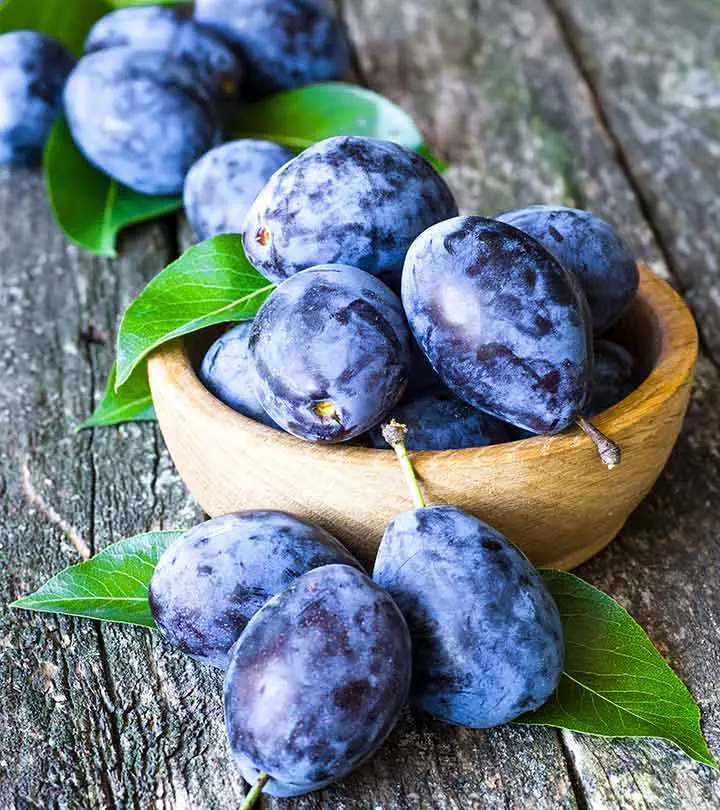

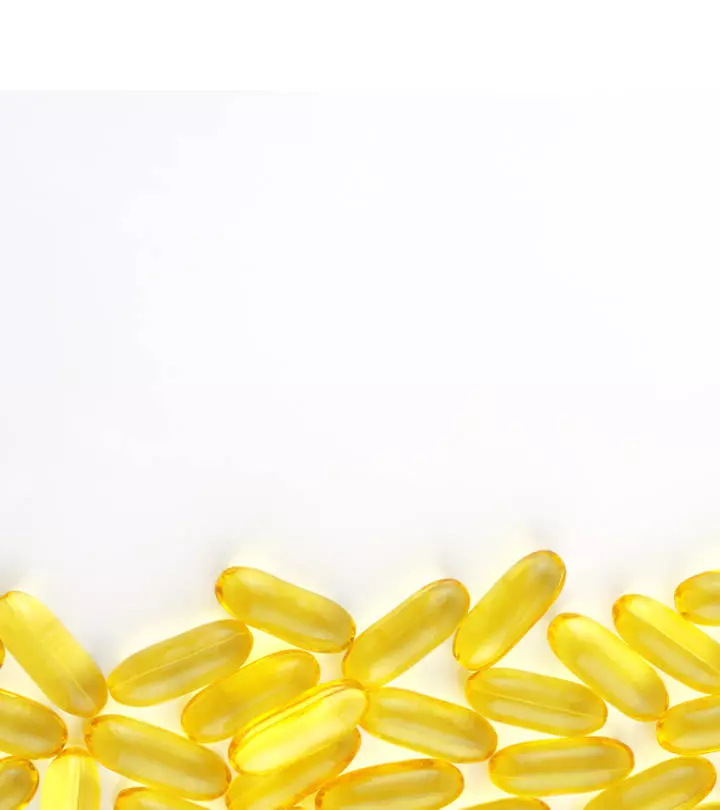
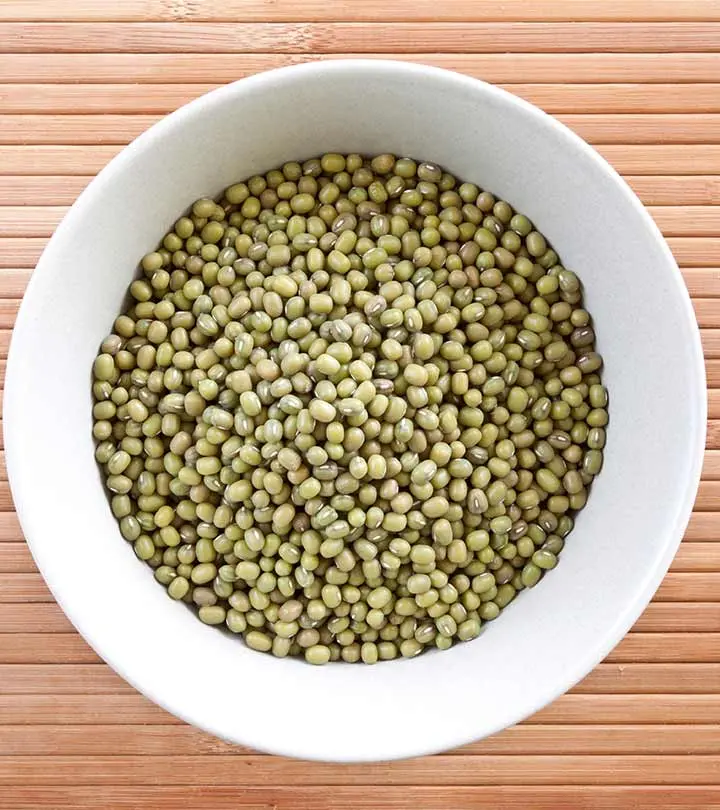
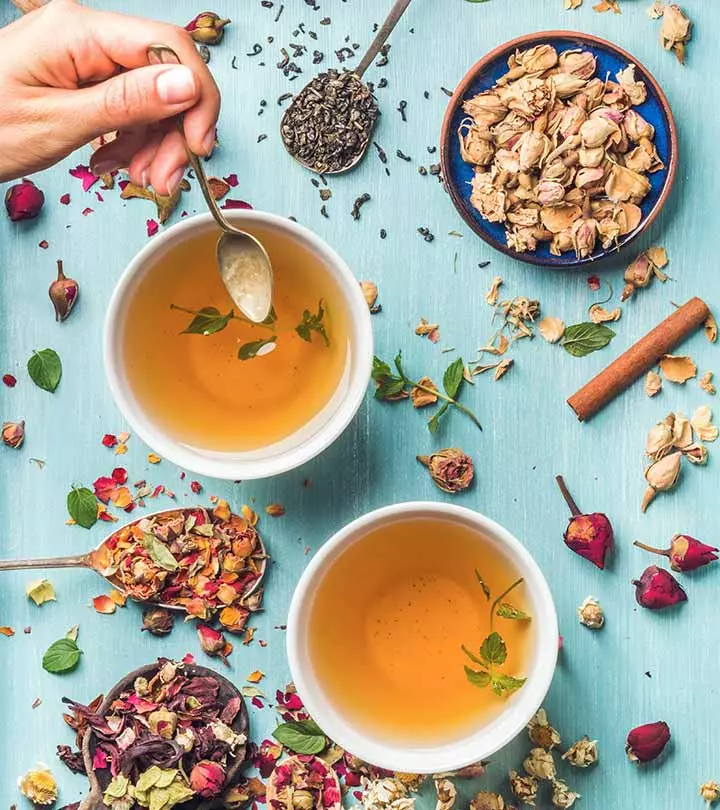

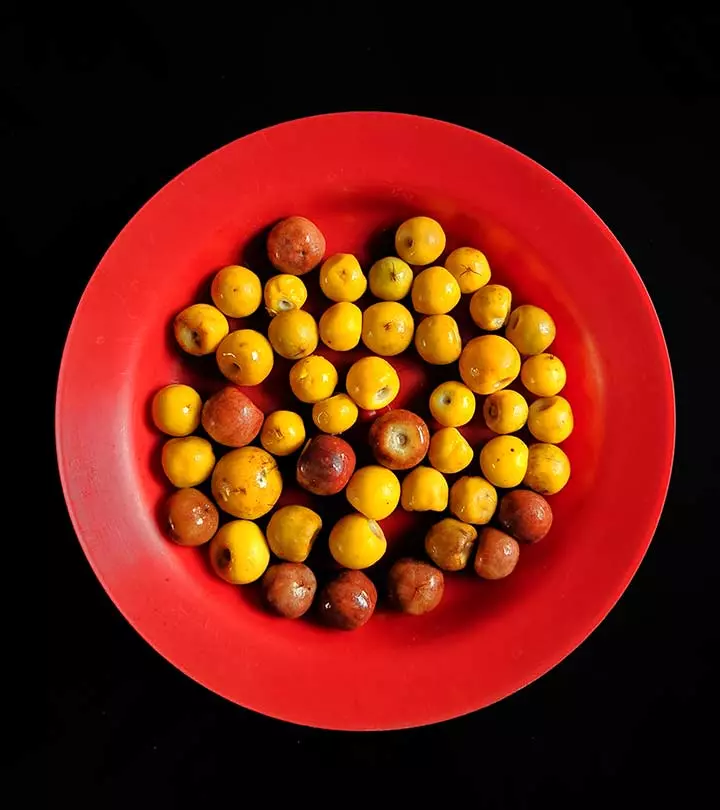
![Medlar Fruit - Benefits, Nutrition Facts, Recipes [Important Winter Fruit] Loquat in a bowl](https://cdn2.stylecraze.com/wp-content/uploads/2021/11/Medlar-Fruit-Benefits-Everything-You-Need-To-Know.jpg.webp)
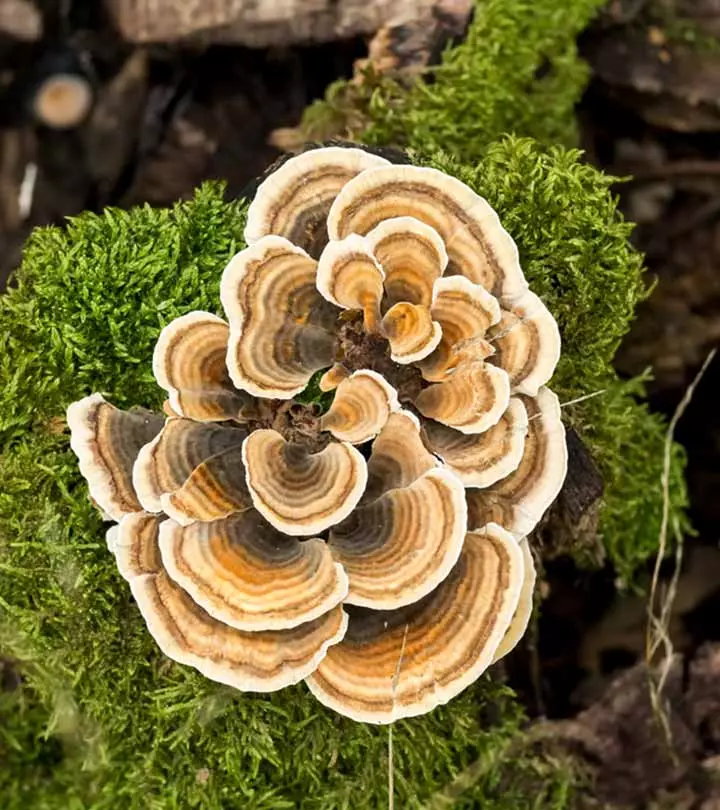

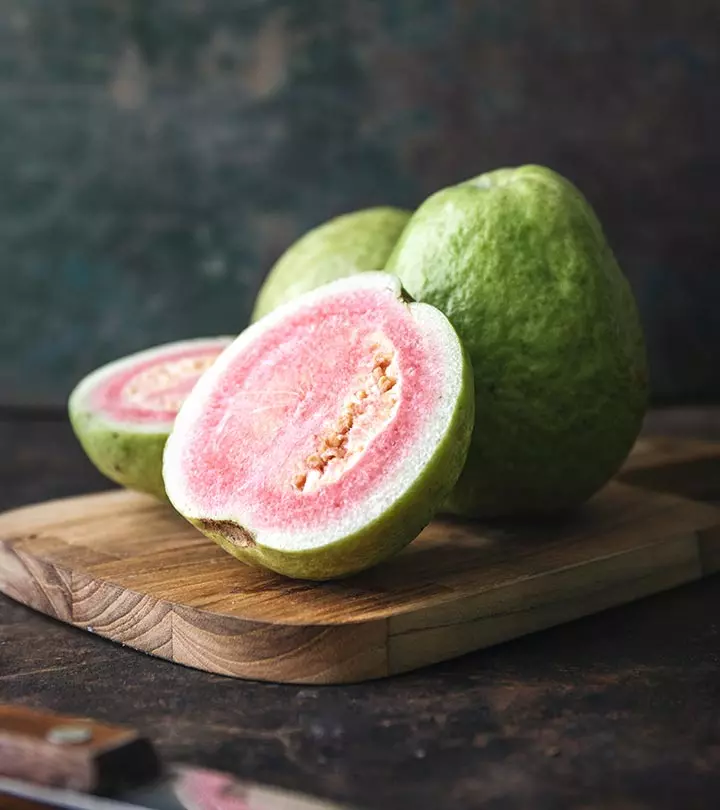
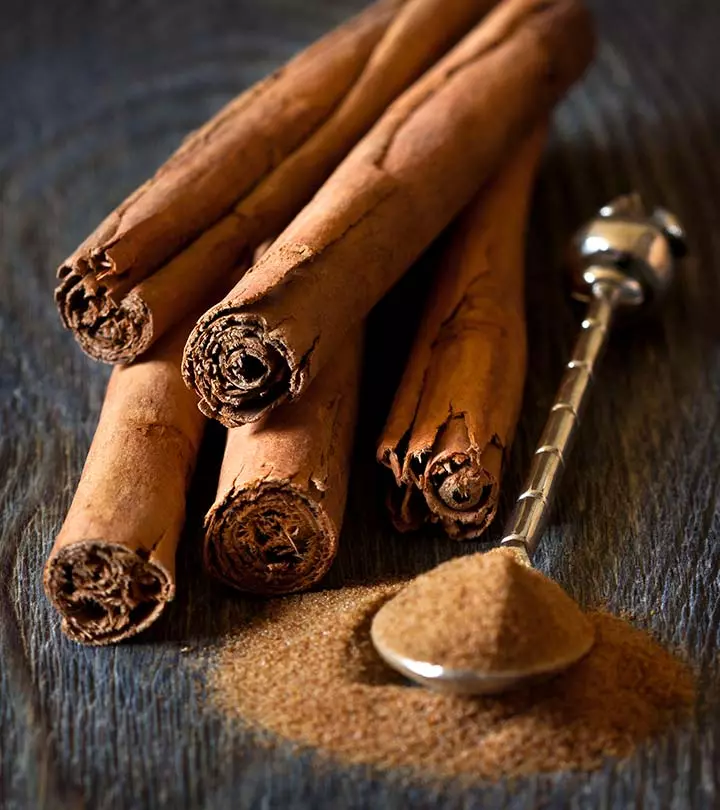
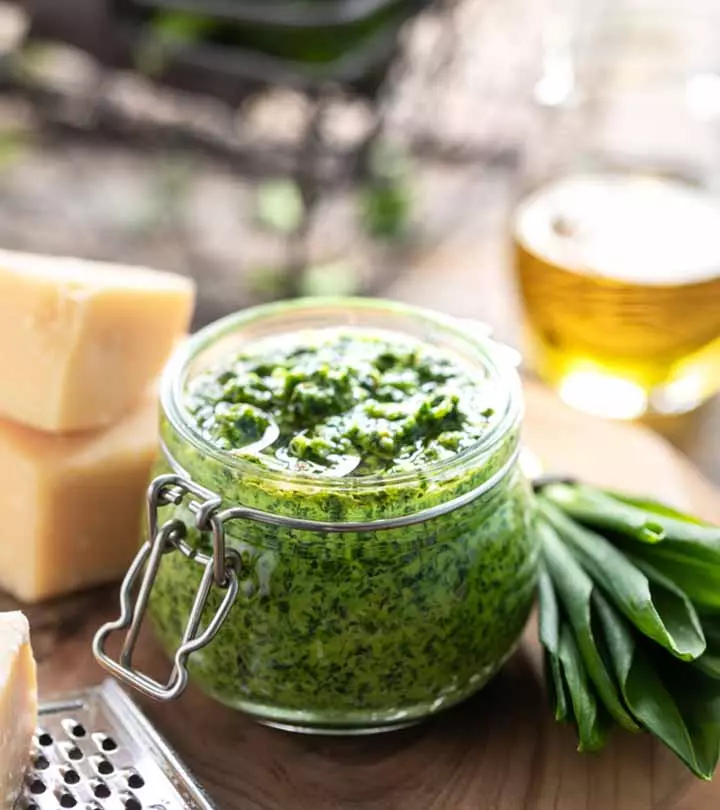

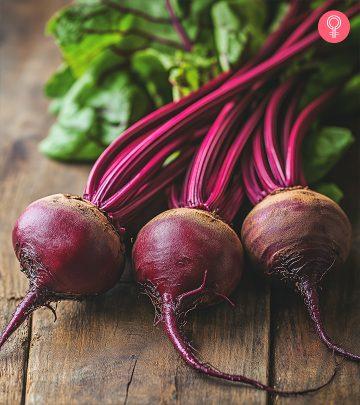
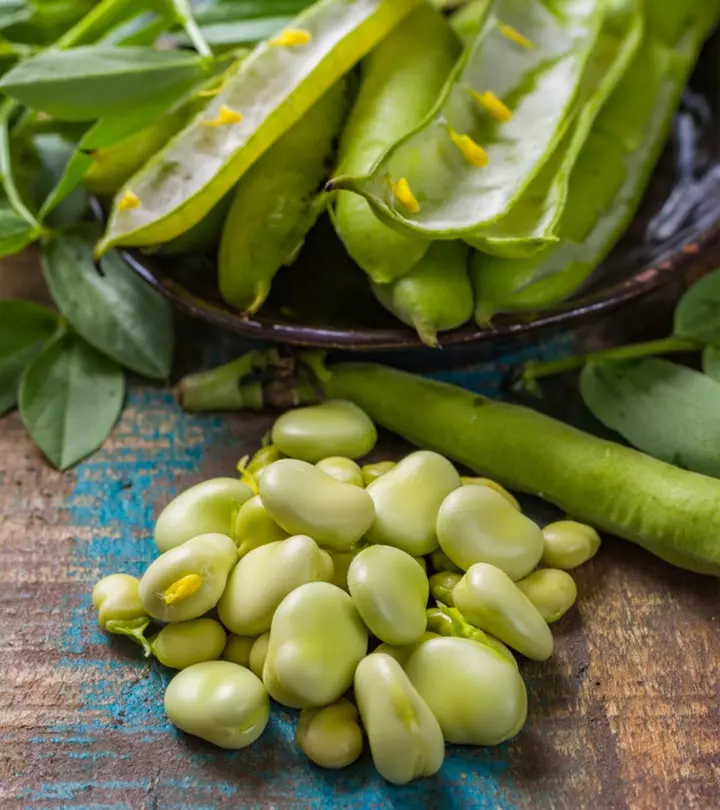
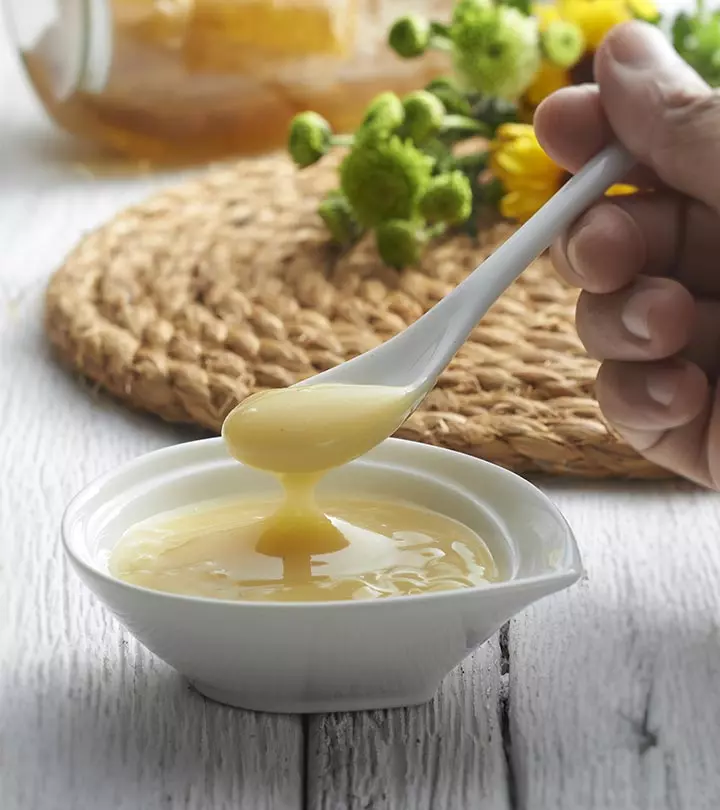
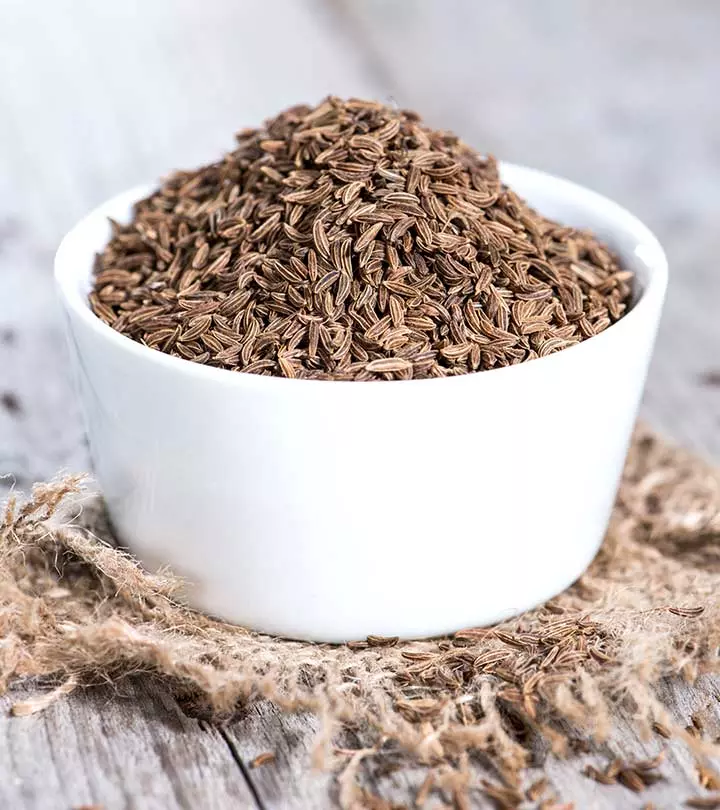
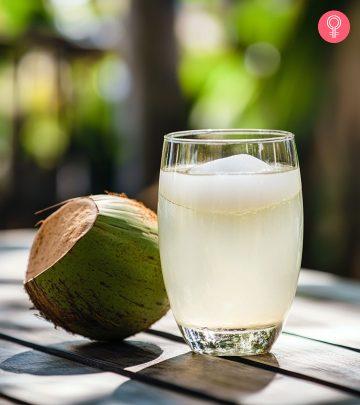
Community Experiences
Join the conversation and become a part of our empowering community! Share your stories, experiences, and insights to connect with other beauty, lifestyle, and health enthusiasts.